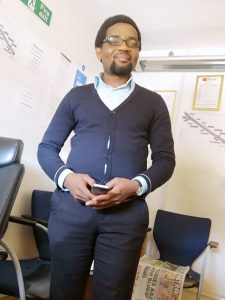“I have to start life all over again”: A Ghanaian deportee’s journey Special Report
Editor's Desk, New in Ceasefire - Posted on Thursday, April 29, 2021 13:19 - 0 Comments

A life upturned
I met Jamel one muggy day of June 2019 in Accra, Ghana’s capital city. We spent an afternoon sitting on the terrace of a little empty restaurant near his brother’s home, where he was staying at the time. Sipping our cold soft drinks, we engaged in a long conversation to retrace the steps that brought him to an unforeseen and unprepared return to his home country.
Jamel had lived in the United Kingdom for 18 years – almost half his life – before he was detained and forcibly returned to Ghana in 2019. He did not commit a criminal offence and had no criminal record. He was taken to an Immigration Removal Centre (IRC) for the first time in 2018, during one of his monthly reporting visits to the Home Office. Several months later, he found himself forced into a plane to Ghana.
Like Jamel, many other foreign nationals living in the UK have experienced similar abrupt turns to their existences – their hopes, dreams and plans shattered, their families separated, their lives disrupted, unexpectedly. As he poignantly puts it:
I was always paying rent, taxes, working; I also worked for a charity, a charity shop in Wood Green, London, every Saturday. I never claimed benefits, never had any criminal records. I don’t know why they deported me. After 18 years, I have to start life all over again.
It is important to clarify at the outset that this piece does not claim to do justice to the complex topic of forced return. Much could be said about the brutality and arbitrariness of UK immigration detention; the opacity of the Home Office’s detention and deportation decision making; the superficial scrutiny of asylum claims and the systematic reduction of detainees’ legal rights to appeal; not to mention the limited or inadequate support available to detainees (which becomes close to non-existent in the aftermath of deportation).
However, my aim is to share with readers some personal accounts that offer a glimpse of the human experience of deportation. In particular, I would like to focus on the human dimension and the extremely disruptive nature of deportation as a tool of immigration control, which interrupts lives and forces individuals to restart and rebuild.
Jamel’s story sheds light on the emotional and material repercussions of involuntary return, not only on those who experience it first-hand but also on their families and communities ‘back home’. His narrative is also testament to the profound pervasiveness and long-lasting effects that detention and forced removal have on people’s psychological well-being.
While some might see unvoluntary return as an opportunity – an opening up of new and unexplored paths, or a chance to have a fresh start – the majority experience it as an act of violence and injustice, the dissolving of long years of hard work and life-building. For Jamel, and many other deported men I met in Ghana, being forcibly repatriated is emotionally akin to feeling like – and being socially perceived as – a failure.
Jamel was 43-years-old when we met. He is a good-hearted and timid man, one of the kindest and most sensitive persons I have ever known. As he told me during our first encounter, all that makes him happy in life is to help others: “All I want to do is to help my family and my friends. If I will be able to help people, I will be very happy. That is my life”. His eyes occasionally filled up with tears while recalling his recent experiences.

Accra by night (Photo: Galatea Scotti)
Jamel’s journey
Jamel was born in Kumasi, but grew up in the Brong Ahafo region, in west-central Ghana, in a small rural village where his parents still live. He travelled to the UK on a tourist visa in October 2001. He obtained two further visa extensions while attending a course that would allow him to enrol into the British Army. Due to some bureaucratic issues and medical complications that lengthened the process, he decided to invest in continuing his formal education instead. He had completed a Bachelor’s degree in Kumasi in Agricultural Science, and so decided to apply to do a Master’s course. He was accepted into five difference courses, but when he tried to switch his tourist visa into a student one, he was unsuccessful. He deferred his course and tried to apply for a student visa again, submitting twenty applications in total. All were refused.
In 2018, Jamel was detained during one of his reporting visits at the Home Office – a routine practice that visa overstayers are usually required to comply with. Most of the deported people I met in Ghana were similarly transferred to an IRC while reporting at the Home Office. Every month, Jamel would tell me later, he had to stand in the cold from 5am to join a long queue outside the reporting centre. He felt ill-treated by representatives of the Home Office, who had also kept his passport for a decade. As he told me: “I like England, I like the people, but the system wasn’t supportive, I hope they will change that”.
While in detention, and with the support of a solicitor, he managed to obtain a judiciary review. A first deportation attempt, in August 2018, was called off because of his precarious health and his pending judiciary review. The Home Office is entitled to re-detain an individual without any warning and, according to a report by BID (Bail for Immigration Detainees – an independent charity that offers free legal advice, information and representation to people held in detention across the UK – the Government does not record data on re-detention. Months later, in February 2019 , Jamel was detained again, which prevented him from attending some of his medical appointments. After a month in detention, he was deported in March 2019. At the time of our meeting, his judiciary review was still being processed. As he explained:
My only crime is that I overstayed but the funny thing is that I overstayed because I was trying to join the army and I tried to extend the visa. I don’t understand, I have been there for 18 years…maybe is because I am from Africa? Or maybe because I have a Muslim name? Actually, I can’t tell.
On the flight back to Ghana, Jamel recalled how the plane, which had a capacity of about 300 people, was nearly empty, with only 24 Nigerian and 6 Ghanaian passengers. This is not unusual, deportation procedures are highly costly for UK taxpayers.
When someone is detained by the Home Office, they are not allowed to bring any personal belongings with them, except whatever they had on them at the time of their detainment. This is also the case when a person is moved from detention to a removal flight. Individuals who are subject to involuntary return will thus often be sent back to their home countries with nothing more than the clothes on their back, perhaps a phone, a wallet, or a handbag. Only the presence of solid social networks, such as friends and family in the UK, can allow them to recover the possessions they left behind in their abandoned houses. If they lack such a network, all is lost. This was Jamel’s case, “I came back with nothing” he said.
During our conversation, Jamel offered an intimate analysis of the circumstances that brought about the forced and unplanned interruption of his life in the UK:
I was just trying to do all the necessary [e.g. providing documentation] to do what I wanted to do [join the army and then pursue an education in the UK], but they didn’t allow me. I don’t know why they deported me, they have done so many mistakes, I had the proofs of my medical condition. I have to start life all over again. I have no hope…
From Jamel’s sorrowful expression and the melancholic tone of his voice, one could not fail to perceive his suffering:
… That is painful. You feel the whole world is on your shoulders, you haven’t committed a crime, but you always feel someone is after you. My friends have been very supportive and are helping me to be strong.
 A collective impact
A collective impact
The distress that is so clearly conveyed in Jamel’s account was soon confirmed by his younger brother, Ahmed, who I met a few days later. He explained how deeply Jamel’s deportation had affected his emotional state and the material challenges facing him and their parents.
He is not happy at all. He is not strong like me, he is soft. I can see sometimes he is emotional, he wants to cry. He wants to help people but now he is helpless. I always have to encourage him. He is shy and finds it difficult to ask what he needs. He wouldn’t tell me if he’s hungry so I always have to make sure there is food on the table for him, otherwise, he would not even eat. It’s not easy for me at all.
Ahmed’s words shed light on how Jamel’s involuntary return was perceived collectively. The whole household was financially relying on him and even the broader community back in their native village had placed hopes and expectations on Jamel’s presence abroad.
Now that he came back with nothing, we are all worried. Everyone is crying at home in the village. He was the one meant to help the family, no one else. Now it’s a big challenge, we don’t know where to start from and where to end it. I’m just hoping and praying that things will get better.
His brother told me how everyone in the community had been proud of Jamel for having made it out of the village and to higher education. Jamel was clearly sensitive to his family’s needs and aware of the social pressures implicitly placed on him, which in turn aggravated his already affected emotive state upon returning home empty-handed. He was feeling ashamed and responsible for a collective loss and for letting his family down.
… My parents are old, and they need assistance, I can’t depend on them. They live in the village, I went to visit them after I came back, they struggle […] I am trying to find a job and a place to stay.
Jamel’s return had a direct effect on his brother’s life, since the latter found himself suddenly deprived of Jamel’s occasional remittances and having to switch from being the younger-supported brother to being the one that must provide support, materially as well as emotionally. Jamel is all too aware of this:
Now, I am living with my brother in a single room because I can’t find a job. He was schooling and he didn’t have a regular job so now he had to interrupt schooling to trying to help me out. I can tell he is worried. I don’t want to be a burden.
A hopeful note
 Jamel’s life story – and the ones of many others like him, whose voices and accounts are missing here but are just as important as his – reveals just how complex and profound the implications of deportation are, not solely on individuals but also on families and entire communities. In some cases, deportation brings about severe economic disruption by bringing an end to remittances, hindering and straining the livelihoods of many.
Jamel’s life story – and the ones of many others like him, whose voices and accounts are missing here but are just as important as his – reveals just how complex and profound the implications of deportation are, not solely on individuals but also on families and entire communities. In some cases, deportation brings about severe economic disruption by bringing an end to remittances, hindering and straining the livelihoods of many.
In too many cases, deportation also separates families, forcing them to live apart for years, if not forever. At other times, it affects mental health conditions, and changes the social perception of individuals within their communities. It can drive people into homelessness and poverty. All too often, it inflicts all of the above.
Ultimately, deportation violently disrupts people’s lives, coercing them to abandon all they had built or worked towards and, to restart – unsupported – from square one. As Jamel plainly expresses it:
I have to start all over again. So, I have wasted almost 18 good years of my life. I just wanted to go to school and gain some knowledge and come back home … I was happy in England because I had ambitions, I was planning my life ahead…
I’d like to travel around the world, work for the UN and help people around the world. If I won’t be able to do that I can at least help in my community. I’d like to start a family. And even if I migrate in the end I have to come back home. But not like this. It is sad, but maybe I have to try to put everything behind and start all over.
Two years on, Jamel’s situation has slightly improved. He has a place of his own and his spirits seem a little uplifted. However, in this post-Covid era, there is only so much one can tell about a person’s emotional state from a telephone conversation or text exchange. Still, I like to reassure myself that signs of improvement are under way; that soon Jamel may find again his peace of mind, that his eyes will stop welling up.
The author’s interview with Jamel was conducted in Accra, Ghana in June 2019.
Editor’s note: The extracts from Jamel’s interview have been edited for concision and readability.



Leave a Reply